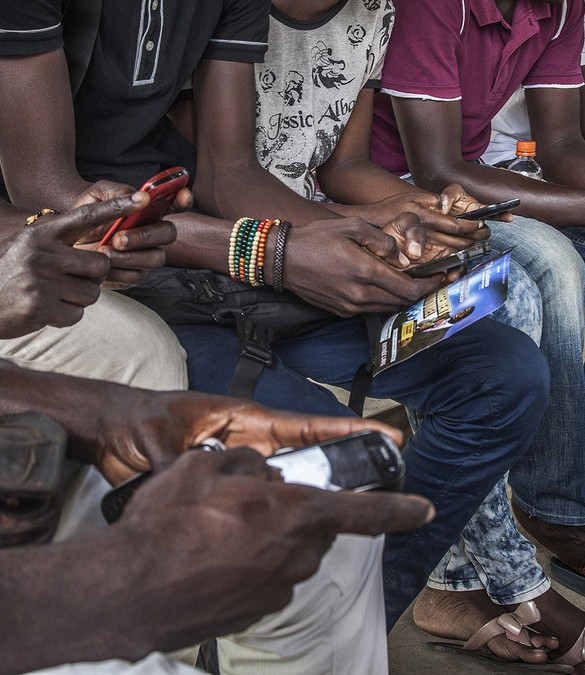Find out the week’s top mobile stories from around the world.
This week.. Google shifts mobile focus to apps and digital assistants, EU fines Facebook over ‘misleading’ WhatsApp data claim, Samsung Pay launches in UK, Why Android is likely safe from a WannaCry-like attack and much more…

Google shifts mobile focus to apps and digital assistant
Reuters
Mobile phone apps took centre stage at Google’s annual developer conference on Wednesday as the search giant announced new features for its digital assistant and its popular photo app while devoting little time to the Android mobile operating system.
Addressing an audience of thousands of developers in Mountain View, California, Google executives delivered a broad-based update to their product portfolio which also included a slate of new features for the Google Home speaker, a job search tool and even a set of new virtual reality headsets.
In a sign of the ongoing strategic importance of Google Assistant, the company’s artificial intelligence-driven, voice-controlled digital assistant, Google announced it would make the product available on Apple Inc’s iPhone, making a play for the higher end of the smartphone market and challenging Apple’s Siri feature on its own devices.
Read more…
EU fines Facebook over ‘misleading’ WhatsApp data claim
BBC News
The European Commission said Facebook had said it could not automatically match user accounts on its own platform and WhatsApp.
But two years later it launched a service that did just that. Facebook said the errors it had made were not intentional.
In a statement, the Commission said: “The Commission has found that, contrary to Facebook’s statements in the 2014 merger review process, the technical possibility of automatically matching Facebook and WhatsApp users’ identities already existed in 2014, and that Facebook staff were aware of such a possibility.”
However, it added that the fine would not reverse its decision to clear the $19bn purchase of WhatsApp and was unrelated to separate investigations into data protection issues.
Read more
Apps have disrupted Mobile Finance in China: App Annie report
Techseen
App Annie, a mobile app market data and insights company, today announced its first Asia-Pacific Retail Banking report, which analyzes how mobile is transforming banking and financial services in the region. This report covers the growth of retail banking and fintech apps and provides best practices with a focus on the countries most impacted in the Asia-Pacific region, namely Australia, China, Japan and South Korea.
According to the report, finance category downloads grew faster between 2014-2016 than all other app categories excluding games combined worldwide. Globally, total sessions in finance apps have increased more than 100% over the past two years.
While the Americas and Europe grew rapidly, APAC’s growth was the strongest. Furthermore, in Asia-Pacific, more than 110 billion sessions took place in finance apps in 2016.
Read more…
Why Android is likely safe from a WannaCry-like attack
CNet
The WannaCry cyberattack has ensnared more than 300,000 computers in 150 countries by taking advantage of outdated versions of Windows that never got Microsoft’s crucial security patches.
Hmm. Millions of devices that are stuck on older versions of an operating system and don’t have access to the latest updates. Where have I heard that one before?
That is, after all, one of the key problems with Android. Only 7.1 percent of its 1 billion users are on Nougat, better known as Android 7.0, the latest version of the mobile operating system. Nearly a third run on Android KitKat or older — versions that came out more than three years ago.
“Over time, the more that Android versions age out, you’re going to have an increasing attack surface for bad guys,” said Josh Feinblum, vice president of information security at Rapid7.
Read more…
Zomato data breached: 17 million user records stolen
Tech in Asia
Restaurant finder Zomato just revealed some shocking information: 17 million user records from its database were stolen. The stolen information has user email addresses and hashed passwords.
“Payment-related information on Zomato is stored separately from this (stolen) data in a highly secure PCI Data Security Standard (DSS) compliant vault. No payment information or credit card data has been stolen/leaked,” the company announced.
It also added that passwords stored with Zomato are encrypted and “so the sanctity of your password is intact in case you use the same password for other services.” Nevertheless, it advised users to change their password.
Read more…
Zimbabwe: Mobile Data War Escalates
allAfrica
With the birth of the country’s first mobile telecommunications company in 1997 and the eventual licencing of Strive Masiyiwa’s Econet Wireless Zimbabwe, competition for the voice market seemed inevitable.
The entrance of yet another player in the form of Telecel Zimbabwe into the fray did not help either.
Entering the market with both cheaper mobile handsets and sim card offerings, the war to get more people talking on the three networks had just gotten tighter.
But as the years passed by, the leading telecommunications company was to emerge buoyed by its ability to expand network coverage and improve the quality of connectivity as services were limited to ordinary voice calls and sms. And something happened many had not seen coming: mobile data…
Read more…
Samsung Pay launches in UK to take on Apple Pay and Google Android Pay
Guardian
Samsung has finally launched its contactless mobile payment solution in the UK, almost two years after its chief rival Apple Pay rolled out, and a full year after Android Pay.
The new contactless payment system allows users of recent Samsung Galaxy S smartphones to pay for goods and services by tapping their handsets on contactless terminals, and pay for travel on Transport for London’s network of tube, train and bus services.
While Samsung Pay was one of the first mobile payment systems to market in South Korea and other countries, it is late to the game in the UK. Android Pay has been available on Samsung and other manufacturers’ Android smartphones since May 2016 in the UK, and has third-party app support with payments inside on-demand food delivery apps, for example.
Read more…
Mobile Health Takes on a New Challenge: Diagnosing Cervical Cancer
Singularity Hub
Technology’s role in modern healthcare is growing. Artificial intelligence is being used for mental health, and smartphones can use add-ons to do things we never would have imagined ten years ago, like diagnose STDs and image our eyes.
Now, mobile health is venturing into new and similarly amazing territory: a smartphone app that uses artificial intelligence and an add-on device to diagnose cervical cancer.
World Health Organization statistics show that 87 percent of cervical cancer deaths occur in developing nations, and there’s a shocking differential in mortality rates between the developed and developing world—of 100,000 women diagnosed with cervical cancer, the disease will kill only two in Western Europe or Australia, but more than 27 in Eastern Africa.
Read more…
Instagram on copying Snapchat: “This is the way the tech industry works”
TechCrunch
“I think it would frankly be silly of us if we were to say ‘Oh, see that good idea over there that’s actually fulfilling a need people have to share more moments of their life? Because one person did that we can’t even go near that idea.’”
That’s Instagram’s VP of Product Kevin Weil’s perspective about cloning Snapchat. He’s the man in charge of bringing Snap CEO Evan Spiegel’s vision to a much larger audience, reforging his features for the mainstream, and then taking Instagram a step further.
But rather than showing guilt, remorse, or reluctance about copying what’s worked for Snap, he sees it as a foregone conclusion — the inevitable march of progress where you either step in line or get left behind.
Read more…
29.1 million Americans still don’t buy stuff on their smartphone
VentureBeat
The smartphone is ubiquitous, without any shadow of a doubt.
The device, which we unlock over 200X every day, is always within arm’s reach — 24 hours a day, seven days a week. And while mobile influenced over $500 billion in retail sales in 2016 — with $140 billion of those sales made entirely on a smartphone — a sizeable percentage of U.S. consumers have yet to make a purchase using only a mobile device.
In fact, 29.1 million Americans have yet to make a smartphone-only purchase, according to the latest research from VB Insight: “Mobile commerce and AI: Consumer affinities, challenges, and the future of chatbots.”













